A Far Future Journey Across a Strange Earth: The Song of Phaid the Gambler (Phaid the Gambler/Citizen Phaid) by Mick Farren
 |
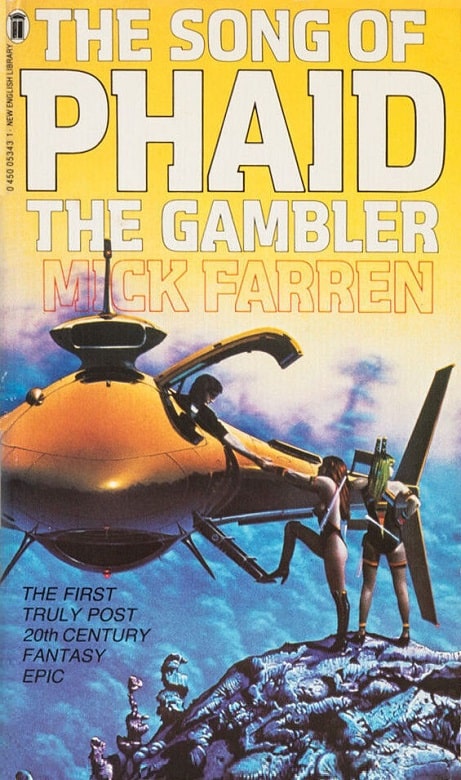 |
The Song of Phaid the Gambler (New English Library, October 1981). Cover by Tim White
Mick Farren (1943-2013) was for a time a sure enough rock star, front man for the Deviants, a sort of proto-punk band in England in the late 1960s. He did a couple solo albums too, then turned to journalism, particularly for the important UK magazine New Musical Express, where he was one of the first to herald the arrival of the official punk movement. And he also began to write fiction, much of it SF — some two dozen novels in all.
The Song of Phaid the Gambler was published in the UK in 1981. It was split in two (sensibly enough, I think, for marketing reasons) for US publication, from Ace in 1986 and 1987 as Phaid the Gambler followed by Citizen Phaid. There are differences between the two versions — I suspect, though I’m not sure, primarily to smooth out the separation into two separate books. I read the US version.
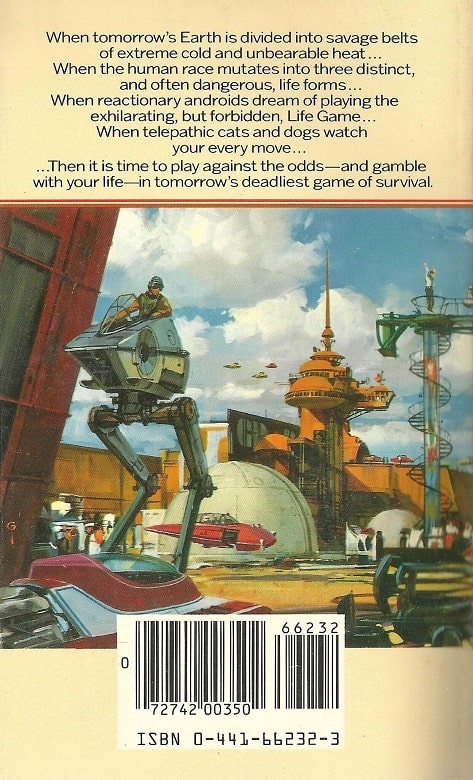 |
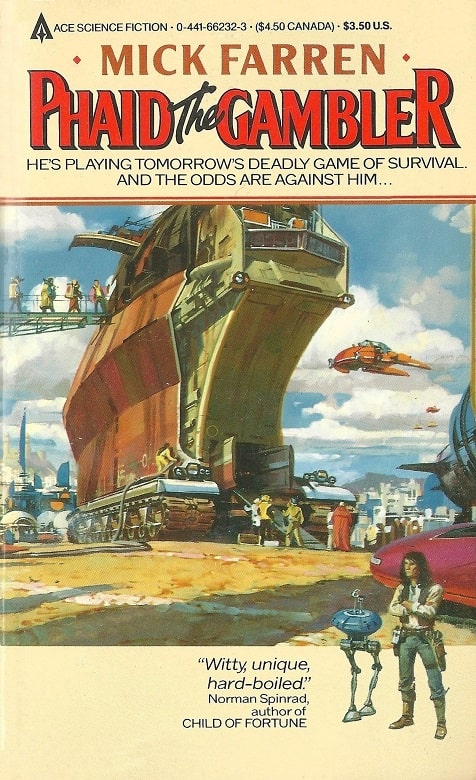 |
Phaid the Gambler (Ace Books, August 1986). Cover by Jim Gurney
I thought the book looked promising on description. It’s set in the far future in a world where the “Lords” have disappeared, and while some remnants of high technology survive, almost no one understands it. The world is divided into torrid zones, fairly temperate zones, and essentially uninhabitable freezing zones.
At first I thought this was an alien planet, but it is hinted later that this is Earth, after the weather control technology has catastrophically failed, and after the more privileged people have departed for the stars. It’s a balkanized planet, anyway, with a number of small sort of city-states, as well as some possibly alien species, or perhaps human variants: the boohooms, somewhat primitive and oppressed people; the marikhs, who run the transportation system; the tharmiers and the hill people and what seem ordinary humans — and also the elaihim, who are humanoid but strange, and seem to have mind control powers. There are also a great many robots, who, as their programming breaks down, develop their own motivations.
Phaid is a professional (of sorts) gambler, who has to get out of town quick when he wins too much money from some thuggish locals. He heads upriver with an accommodating woman, and begins in a peregrinating way to head to the Republic, supposedly one of the more “civilized” city-states. This involves a series of encounters with different folks and different modes of transportation, including the river woman, and a boohoom who he treats with courtesy, and a robot, and a hill man named Makartur, and the elaihim. After some vicissitudes he ends up in Chrystiana, the capitol city of the Republic, and realizes that things are very unsettled — Chrystiana-Nex, the ruler, is under the sway of a rogue elaihi, and a revolution is brewing.
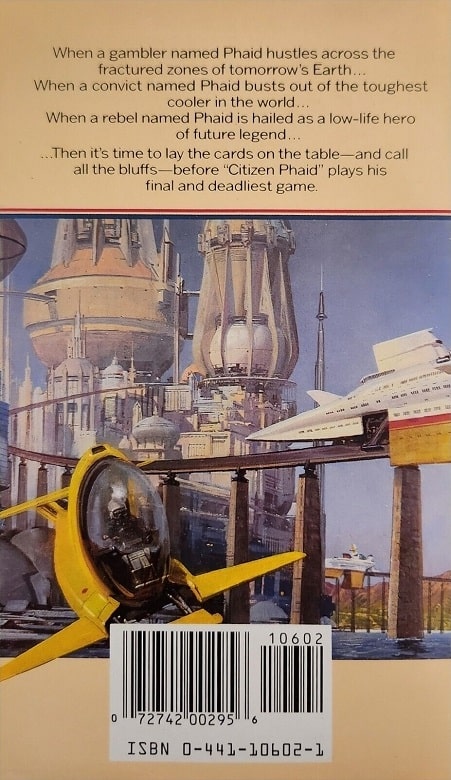 |
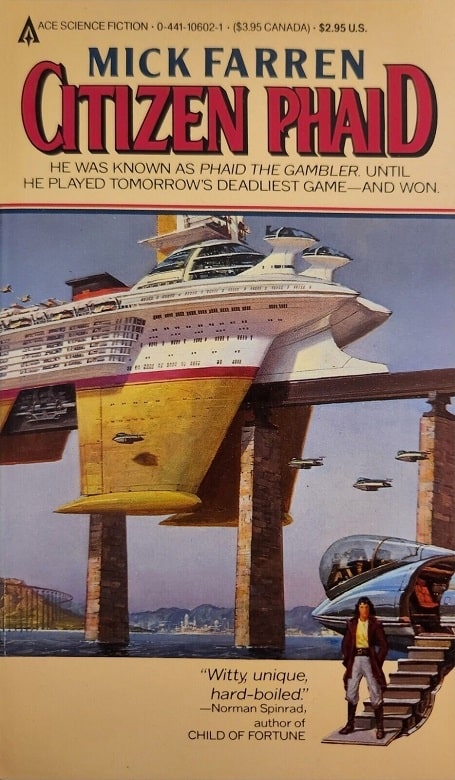 |
Citizen Phaid (Ace Books, January 1987). Cover by Jim Gurney
Phaid, without really meaning to, gets involved — he can’t seem to stay out of trouble. He makes friends (?) and takes lovers from the aristocrats, while also having connections with the revolutionaries. He learns that Makartur, his erstwhile companion, has sworn to kill him. The revolution comes, and while he tries to escape the resulting chaos he is arrested at random and thrown into a horrible prison. He is framed as a serial murderer, is set free for obscure reasons and ends up escorting Chrystiana-Nex and eventually the rogue elaihi across a freezing zone to an ultimate confrontation that could end up in the extermination of humanity.
This is all, at base, a lot of extremely derivative ideas thrown together largely at random, with a large heaping of cynicism larded in. Jack Vance — a sort of curdled Vance — is one obvious influence. There are some colorful notions — none at all original but potentially entertaining. There is a sort of message, not at all inspiring or convincing — more or less, people are terrible and they deserve what they get. Phaid is certainly not an admirable character, nor is he meant to be, but neither is anyone else, save perhaps a boohoom and a robot. The plot is at first extremely discursive, with potentially interesting characters and situations introduced then abandoned. though by the end it coheres somewhat around the plot of the rogue elaihi to take over the world.
All that — while it could never have been great — could have more or less worked as a modest diversion. But there is a more fundamental problem. The prose is terrible. Some of the issues can be laid at the feet of terrible copy-editing (late in the novel, for example, a group of people who were meant to be called “Priests Militant” are rendered “Priests’ Militant” — a minor thing but fingernails on the blackboard to me.)
But a lot is just lazy writing — cliché after cliché, words that don’t mean what the writer seems to think they mean, shabby metaphors and slack rhythms. It’s not just well written.
I don’t know if Farren got better — to have continued publishing you would hope he did — but this really is not a good novel.
Rich Horton’s last article for us was a Retro Review of two issues of The Magazine of Fantasy & Science Fiction from 1958 and 1961. His website is Strange at Ecbatan. Rich has written over 200 articles for Black Gate, see them all here.
Re-read Protectorate afterJohn’s post about Mick Farren, mainly because I knew I’d read it but couldn’t remember anything about it. Sounds like there are some similarities to Phaid the Gambler? One character is a poet/minstrel who inadvertently gets sucked into the revolution against the wasps. Plus, the world-building was also an amalgam of various tropes. But while I can see why it didn’t leave a lasting impression, overall I thought it worked. There was enough going on to keep the book interesting, plus Farren deserves some credit for having no illusions about how humanity would fare if alien invaders ever did turn up* – Battlefield Earth it is not.
* maybe a perspective coloured by the UK’s experience of WWII.m
Totally disagree, these books are wonderfall.
I think you either get Micks stream of consciousness pacing or you dont, and I suspect those of use who have lead shall we say ,colourfull lives, get where he is coming from.
These are the only books I regularly re-read, always a pleasure.